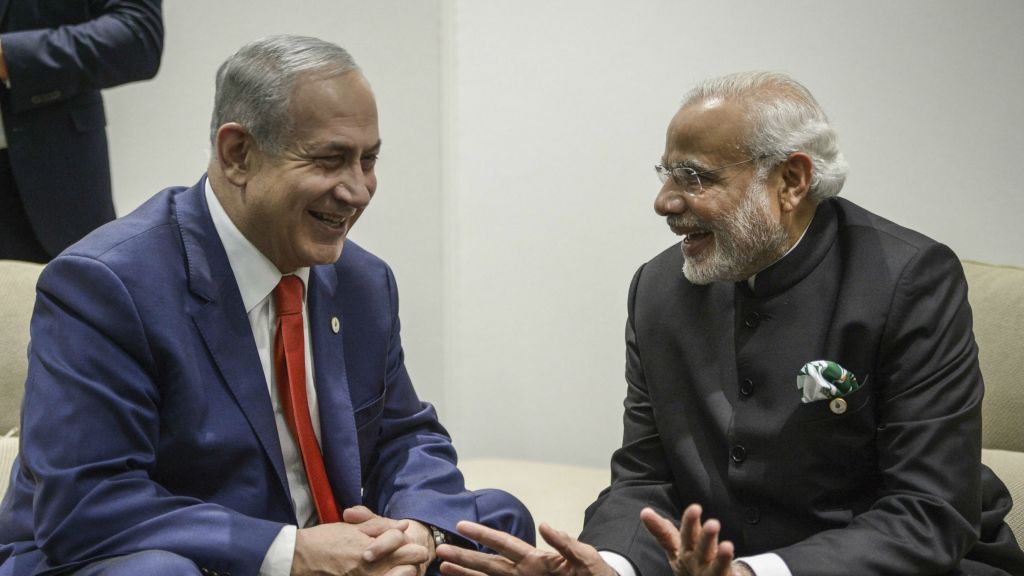A historic visit to Tel Aviv
July 3, 2017 | Expert Insights

On July 4, 2017 (Tuesday in accordance to Indian time-zone), Indian Prime Minister, Narendra Modi would be visiting Israel. This visit is historic since it marks the first time an Indian PM will visit the country.
The two-day visit will find the Indian Prime Minister meeting with Israeli Prime Minister Benjamin Netanyahu. During this time, they are slated to discuss issues that will mutually benefit both nations. Modi will also be meeting the Indian diaspora in Tel Aviv in addition to other engagement.
As India takes a step forward in cementing its equation with Israel, it is also important to understand the events that have led to this historic moment.
Background
Today, India shares a relatively friendly relationship with Israel primarily marked by defence contracts exceeding half a billion dollars in 2016. India is the largest buyer of military equipment from Israel and Israel is India’s second largest defence supplier.
But it wasn’t always the case.
Historically, many Indian leaders, including Mahatma Gandhi did not believe in the creation of Israel. While Gandhi was empathetic to the cause of the Jewish people, he did not support a Jewish state. India voted against Palestine being separated in two in 1947 and voted against Israel becoming a member of the United Nations. Prime Minister Jawaharlal Nehru wrote in a letter saying, “Palestine is essentially an Arab country, and must remain so.” In 1950, India officially recognized Israel as a state. Nehru would later explain that India was worried about offending Arab nations. Despite the recognition, India did not pursue full-fledged diplomatic relations with the country.
There were other reasons for a muted relationship between the two nations – India had closer ties to the Soviet Union (Russia); tried to counter the threat of Pakistan through the help of Arab countries; and India had a number of its citizens working in Arab countries.
There were also ideological reasons for this opposition – India did not approve of a Zionist state being created for religious reasons. This was one of the reasons, it opposed Pakistan as well.
In 1985, Rajiv Gandhi met the Israeli Prime Minister during UN General Assembly’s annual meeting. This was the first time such a meeting had taken place between leaders of both nations in public.
In 1992, diplomatic ties were established.
This shift occurred for geopolitical reasons. The formation of the Organisation of Islamic Cooperation in 1967, being one of them. Over 13% of the Indian population follows Islam, which roughly translates to around 172 million people. However, Pakistan has long opposed India’s entry to the OIC, thus there is the perception that Indian Muslims are being neglected.
Once diplomatic ties were established between the two nations, this relationship progressed. In 1997, during the Vajpayee government Ezer Weizman, then then President of Israel visited India. In 2000, Indian Foreign Minister, Jaswant Singh travelled to Israel.
Analysis
It can be argued that the rise of Islamic terrorism is what that has brought the two nations together. The duo now share military, defence and strategic alliances. Israel has also played a key role in helping India in addressing the problems it faces in agricultural sector. The two countries signed the Agreement for Agricultural Cooperation in 2006. Since, Israel has offered critical aid in helping Indian farmers and the industry. The country has helped farmers adopt better technology, practices etc. In fact, by 2014, farmers in states like Haryana (where Israeli know-how was implemented), reported increase in income and yield. This has been one of the biggest successes of the bilateral ties between the two countries.
However, given its own strong relationship with Palestine, India has had to conduct a delicate balancing act in the process. Modi hosted the Palestinian president Mahmoud Abbas in June 2017. IFS Pavan Kumar, India’s Ambassador to Israel has written of this relationship, “We will continue to work with the Palestinians because we do support their cause. But at the same time, we want to keep our relations with Israel independent of their relationship with Palestine.”
Assessment
Our assessment is that historically both nations have a lot more in common than it might appear. Both were British colonies and both came into existence in a contemporary sense around the same time. India and Israel were both established as democracies in 1947 and 1948 respectively. A bloody partition was also a catalyst for the creation of both the states. Having said so, India still will have to carefully orchestrate this relationship with the Palestinians.








Comments